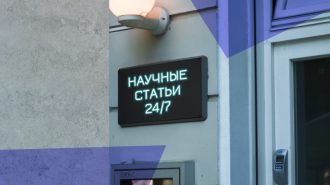An international team of scientists analysed 1,378 stories in the world's leading media about casualties of the war in Gaza. It turned out that 85 per cent of these publications did not distinguish between fighters and civilians, and 95 per cent used data provided by the Gaza Ministry of Health, which is run by Hamas. Why are reputable publications using inaccurate information and what can Israel do to counter this? T-invariant spoke to the initiator of the study - sociologist Tatiana Gleser.
publication
The redistribution of the market for the publication and distribution of academic scientific journals has led not only to serious delays in the publication of scientists' works, but also to Russia's self-isolation in the global market of scientific periodicals. By the beginning of December 2024, almost 75% of Russian academic scientific journals have not gone to press on time. This is the price of striving to publish scientific journals with a "Russian identity" and without foreign influence. T-invariant tells us what has already happened to Russian scientific periodicals and what else may happen to them.
Recently, American scientist Sam Payne received a review of his own article published three years earlier, but now its authors were five employees of Sechenov University. So the world scientific community learnt about the Russian company "International Publisher", which is engaged in the production of fake scientific articles and places them for money in major foreign journals. More details - in the material T-invariant.
A recent article by a group of American professors on the introduction of DEI into university practice in the United States has caused a wide resonance. To what extent can DEI be considered a purely American phenomenon, and to what extent has it been assimilated by academic communities in other countries? Germany is a curious example. This is the subject of an article prepared for T-invariant by Alexander Libman, Doctor of Economics, Professor of Russian and East European Politics at the Free University of Berlin.
Students of the "School of District Anti-Corruption" together with Groza and T-Invariant studied the composition of expert councils at the Ministry of Education and Science of the Russian Federation. It turned out that more than 10 per cent of the experts who influence decision-making "on the most important issues of the ministry's activities" are plagiarists and violators of academic ethics.
Over the two and a half years that the war in Ukraine has been going on, more than two thousand scientific articles dedicated to the "special military operation" have been published in Russia. Among them are some that have almost no relation to science, as well as quite professional studies by Russian scientists in the fields of law, psychology, sociology, and military affairs. T-invariant has read these articles and tells us what they are about.
RSUH, RUDN, Financial University under the Government of the Russian Federation, MGPPU were among the universities that founded and published journals with violations. "Laboratory of University Transparency" (Lupa) and T-invariant checked government procurement of 100 higher education institutions and found out that some of them conclude contracts with dubious publications.
The DEI ideology is diversity, equity, inclusion. What will happen to science if DEI principles win? T-invariant talked about this with one of the authors of the article “Politicizing science funding undermines public trust in science, academic freedom, and the unbiased generation of knowledge”, professor of biomedicine at Northwestern University in Chicago Igor Efimov.









